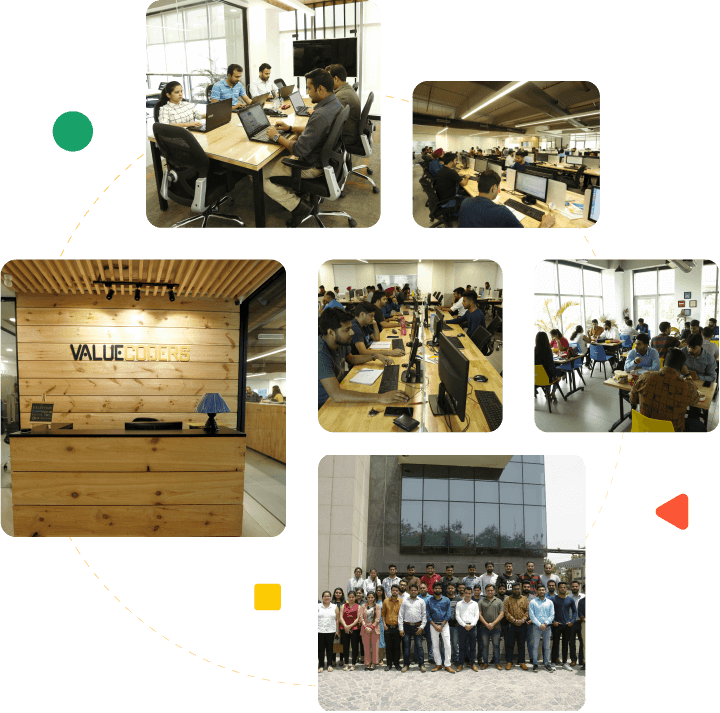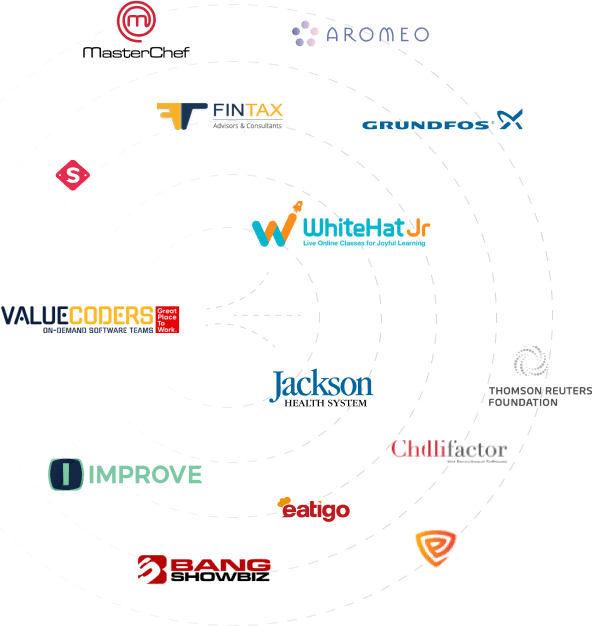Get free consultation and let us know your project idea to turn it into an amazing digital product.

Outsourcing software development to ValueCoders means peace of mind of having a reliable service partner on your side. As one of the top IT outsourcing companies, we stay on schedule, scale the teams and ensure product quality.

For the past 18 years, we have been delivering software outsourcing services worldwide. Our business domain knowledge, proven methodologies, and technology expertise of skilled software professionals yield high-quality solutions that add value to businesses.
From Startups to Enterprises, Product Companies to Digital Agencies, and SMEs to Governments, we cater to them all for their diverse technology requirements. Our utmost effort allows us to lead the market of top software companies.
Besides, our cost-effective, professional, and proactive software development outsourcing services make us one of India’s best-in-class software outsourcing companies.
Consistently recognized as one of India's best software development companies and proven success over 17+ years with thousands of customers globally, you can entrust us with your software development and outsourcing needs.
Contact Us

Software development is the process of creating, designing, testing, deploying, and maintaining software applications. It involves writing code – either from scratch or by using existing frameworks, such as those provided with languages like JavaScript and PHP – to create the software that makes up an application or website.
Software development involves a variety of steps aimed at providing a user-friendly product through collaboration among developers, coders, and designers. The first step in developing any piece of software usually begins with understanding the requirements for it. This may involve reaching out to customers or working with project managers to understand what problems need to be solved and how exactly they should be solved. Once these needs have been established then planning can take place which includes deciding how long it will take and what resources are needed (hardware or cloud services).
The actual coding part is where an experienced programmer creates the logic behind each step involving low level programming language(s) such as Java, C++ etc. Next comes putting together all the components into one cohesive unit by using libraries for common functions during the integration testing stage followed by debugging errors thrown up after running tests against data provided during initial requirement gathering phase.
After ensuring it is error-free teams work on integrating this code along with databases making sure there are no major issues while switching between different environments/machines/clouds when test suites are used before deploying onto production servers; finally releasing them as stable products which can serve users reliably over time. This whole cycle referred to as “software development” requires great skill & experience coupled with purposeful communication among team members, so that end result meets customer expectations efficiently driving future growth prospects of their business through better customer engagement & satisfaction levels eventually leading towards its success in long run!
The term software development refers to designing and programming applications or systems. Software development is a complex field involving many aspects and disciplines, from cloud computing to mobile app design.
Generally, there are three main types of software development: web, desktop, and mobile application development.
1. Web Development: Web developers create websites for various business functions, such as information portals or content management systems (CMS). They use HTML, CSS, JavaScript, and other programming languages to create dynamic pages that interact with databases. To ensure the website runs smoothly on different platforms, they also need knowledge of server-side technologies like PHP or Python. Some popular frameworks used by web developers include AngularJS and React JS which help them streamline their workflow by providing reusable pieces of code for frequently used operations such as user authentication or creating responsive layouts & designs, but there are lots more out there too depending on their requirements!
2. Desktop Application Development: Desktop applications run locally on computers instead of on a browser window through web technology like HTML5 & CSS3 etc., so these require coding in languages like C# (.Net), Java/Swing (Java) etc combined with UI design skills (like XAML). This type often involves multiple steps to compile the project into an executable program – from base logic written with C#/Java then compiled into machine commands using compilers before being packaged up into installers so they can be easily sent over networks & distributed electronically across machines worldwide! Together all these processes provide one big unified solution which makes it possible for users, no matter where they are located access this executable program having no extra downloads needed beyond the initial installation time period made available via CD’s /USB sticks/Download sites, etc.
3. Mobile Application Development: As its counterpart desktop app dev requires understanding various protocols & APIs required when working specifically inside tiny screens with limited resources compared not just desktops but also laptops due to the amount of memory/CPU power available!. Additionally, certain adaptations are sometimes needed when it comes adapting existing projects created for larger machines onto devices running iOS Android os version differences making debugging harder sometimes if one does not plan ahead properly from the start on how best address those solutions so that even though apps may look slightly similar at times due internal constraints mentioned before works almost same end result desired regardless platform! Popular tools here include Xamarin Studio Visual Studio allowing progress much faster than doing things completely manually.
Selecting, negotiating, and contracting with a software development company can be daunting. To achieve the best possible outcome, it is essential to do your research and understand the options available to you.
The first step in selecting a software development company is asking for quotes from multiple providers that meet your needs. When requesting quotes, provide an overview of the project, including your desired timeline and budget requirements, so that companies can accurately assess their ability to carry out your project and give you an accurate quote.
Once you have received quotes from potential partners, it’s time to evaluate their proposals. Ensure each proposal provides all of the specifications outlined in your initial request for quotations (RFQ). Additionally, look for details about future revisions or alterations as well as adjustments related to development costs should any changes arise throughout the course of the project. Also, double-check that proposals include structured payment terms with appropriate milestones and incentives generated by successful completion deadlines since this will help protect both parties throughout operations.
The next phase involves contract negotiations between both parties: outlining all key points addressed by the previous discussion plus adding any other relevant legal details such as limitations in liability or confidentiality clauses, among others before finally executing it through either digital signatures or physical copies on paper depending on local regulations wherever it applies.
To ensure both parties are receiving equal treatment when negotiating contracts its advisable always to involve professional legal assistance when needed, which serves more than necessary self-protection whenever disagreements may occur regarding contractual matters during service delivery periods for instance, lack of defined responsibilities causing failure scenarios due to harsh interpretation standards sometimes even contrary from what was initially agreed upon.
Keep track of every mentioned requirement, including non-functional features like security protocols or any potential regulatory compliance applicable according to applicable legislation not covered yet by requested documents ensuring agreement conformity.
By following these steps – asking for quotations from different vendors (RFQ), evaluating their proposals/partnerships, contracts/negotiations -selecting a software development partner should become much easier!
Researching and contacting a software development company can be daunting, but it doesn’t have to be. You can identify the perfect partner for your project with the right research and knowledge.
The first step is to research software development companies that are capable of delivering your project requirements. Start by browsing industry sites such as GoodFirms or Clutch to get an idea of which companies specialize in the type of work you need done. You should also consider going through portfolios on these websites to find firms with proven experience in creating similar projects. Additionally, take a look at reviews written about each firm you’re evaluating so that you have information from previous clients who have worked with them in the past.
Once you’ve identified several potential partners for your project, contact each one directly via email or phone call. During this conversation, make sure to discuss any specifics related to cost, timeline and data security agreements – these factors will help narrow down your search even further. From there, request references from prior projects they’ve completed and follow up with those references for more insight into their services before making your final decision on whom to hire for the job at hand.
Finally don’t forget that when researching a software development company ask questions such as: What is their process? How much flexibility do they offer? What technology stack do they use? Do they provide ongoing support after delivery and is it included in their service package? Answering all these questions will ensure that you pick the best partner possible!
Drop us a line and we'll get back to you immediately to schedule a call and discuss your needs personally.
The cost of a White Label plan varies depending on the features and services you require. Generally, White Label plans are designed to provide businesses with a wide range of resources that enable them to create their own brand or website.
For basic setup needs, the cost can be anywhere from $50-$80 per month, depending on your specific requirements. This price typically includes domain hosting, site design, product customization, and development features.
In addition to the monthly fee for using a White Label plan, extra costs may be associated with certain services, such as storage fees or payment processing fees.
Ultimately, it’s important to weigh up all of the pros and cons when making this decision in order to get the best value for your money and ensure that it meets all of your business goals in terms of quality service delivery and customer satisfaction.
White Label plans are designed to provide services that can be branded and customized for individuals or businesses. This type of plan offers several advantages, including the ability to make a product or service more unique, increase the value of your business through branding, and create an instantly recognizable identity.
The services typically included in white label plans vary greatly depending on the provider but generally provide access to content such as articles, videos and imagery that can be used as part of an overall marketing strategy. In addition, these plans may also include consultation services so you can figure out how best to use your available resources.
Other popular white-label services include website development, custom logos and branding elements, online store integrations, search engine optimization (SEO) campaigns, email marketing solutions and content management systems (CMSs).
At ValueCoders, our mission is to provide world-class offshore software development services and solutions. We have been in the business of providing application, website, and mobile app development services for over 18 years; hence, we understand the particular needs of businesses who want to outsource their projects.
By choosing ValueCoders for outsourcing services, you can enjoy multiple benefits that include cost savings, dedicated teams for project execution with proficient developers & advanced technology utilization like AI/ML/automation, etc., with complete transparency throughout the process to make sure that you’re fully aware of what’s going on at every stage of your project lifecycle.
Yes, we can definitely help you with online marketing. We are a leading IT outsourcing company that specializes in providing cost-effective and reliable web development services. Our experienced professionals are well-equipped to help you build an effective online presence while keeping up with the latest trends in the digital world.
We offer website design, search engine optimization (SEO), pay-per-click advertising (PPC), content creation, email marketing, and more. When it comes to website design, we provide custom designs that fit your brand identity and ensure a seamless user experience for your visitors. Our SEO strategies improve visibility on major search engines such as Google and Bing.
Pay-per-click (PPC) campaigns are also available through Valuecoders so you can target specific audiences at an affordable price by placing ads on relevant websites or social media platforms – all while tracking and optimizing performance metrics continually to increase ROI over time.
Our consultants will respond back within 8 business hours or less.